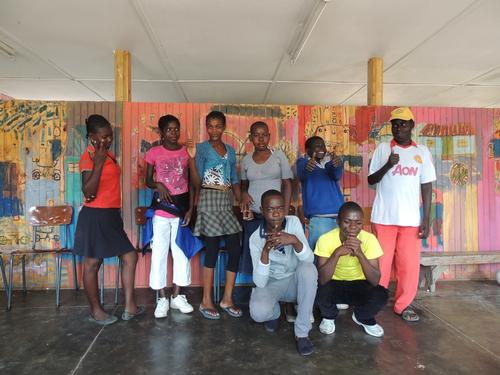Telling a child that they have HIV can be a long and delicate process.
In Epworth, near the Zimbabwean capital, Harare, Médecins Sans Frontières (MSF) has set up HIV support groups where adolescents can meet others living a similar reality. Through sharing their stories, and connecting with one another, their newfound solidarity gradually helps them to become more self-confident.
Chido is an 11-year-old girl, but she looks much younger. Her big brown eyes shine bright, and she smiles and laughs aloud as she plays with the other children. It’s hard to imagine what she has been through.
Chido is HIV positive, and because of her status most of her family—her grandmother, step-father and three step-siblings—shunned her at home. Yet she didn’t know why. Her mother had told her that she had asthma, which is why she was sick and had to take the tablets, so she couldn’t understand why her family ignored and avoided her. And because she didn’t feel sick, she stopped taking her tablets regularly.
“Living with HIV can be confusing and difficult for young children, and is often particularly tough for those orphaned by HIV who are also HIV positive. They can be badly treated at home, encounter increased stigma and feel extremely isolated. Many of them never tell anyone what is happening to them and suffer in silence,” says Ann Sellberg, a medical doctor working with Médecins Sans Frontières in Epworth.
As Chido continued to grow, her adherence to the life-saving antiretrovirals deteriorated to the point that the doctors referred her to MSF’s HIV support group. Only then did she finally learn about her status.
“Finding out about HIV was a great relief for Chido, but also for her mother, who hadn’t felt able to tell her daughter what she really had,” explains Ann. “Now that she better understands the disease she has, she is doing a lot better emotionally, plus also adhering better to her medication plan.”
Disclosure is always a delicate thing. Parents are often afraid to tell their children because they fear the consequences of stigma. Mothers who have passed the virus to their unborn children can feel very guilty. But there are additional issues according to Joseph Alick, a Médecins Sans Frontières mental health officer.
“Sometimes women themselves don’t know their own status until their first pregnancy. Pregnant women often don’t show symptoms so they get a terrible shock when they discover that they are HIV positive,” he says.
After a positive test for HIV, a pregnant woman is immediately started on antiretroviral therapy (ART). “However, it is difficult for a newly diagnosed woman to go home and tell her husband about her status, because of the blame game,” Joseph says, pointing out that the Zimbabwean society is very patriarchal. “Many people still think that being HIV positive is a sign for sleeping around, and that the woman is guilty.”
According to the World Health Organization, Zimbabwe remains one of the countries that is most affected by HIV/AIDS, with nearly 15 per cent of the adult population infected by the virus. Zimbabwean Ministry of Health and Child Welfare estimates that ART coverage had reached almost 80 per cent in 2013, whereas the rate of access treatment for adolescents was only half.
“At school, children learn that HIV is passed from one person to another by sexual intercourse, so when they find out that they are positive they are shocked and confused,” Alick says, explaining that it is often the HIV counsellors who inform the children about transmission from mother to child.
Teenagers frequently refuse medication because they fear disclosing their condition or that others will expose them, worried about the lack of guarantee that their condition won’t become known. Though there is no guarantee, the counselling teams encourage the children to undertake responsible disclosure, and not to be ashamed of their status.
But the HIV support group in Epworth is about more than counselling. It becomes a safe haven where they are all treated equally, where they can play, sing, dance and just be themselves without fear of stigma.
Chido has a role in a theatre play about sexual abuse. She looks confident, she looks happy. “At home things are better now,” she says. It makes a great difference that she can now exchange frankly with her mother about her disease. Ann adds “It’s rewarding to see how strong they become together—not forgetting how much fun they have!”
In 2014, a total of 165 HIV positive patients aged under 20 years received ART through MSF’s project in Epworth. Eight percent of these patients were under 15 years of age. This year, MSF will continue to advocate for increased access to HIV testing and treatment for children and adolescents.



